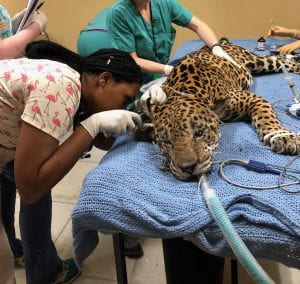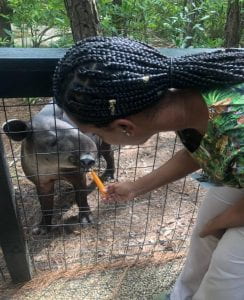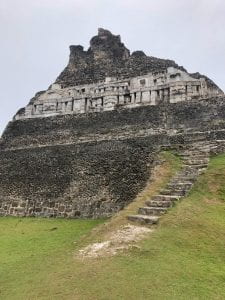This summer I had the opportunity to participate in a one-week experience at the Belize Zoo and Tropical Education Center through a course at Cornell called International Experience in Wildlife Health and Conservation. The course is a partnership between Cornell and the Belize Zoo in Central America. As an aspiring wildlife veterinarian, I found the course to be highly rewarding as it was unlike any other offered in the core veterinary curriculum.
The Belize Zoo was started in 1983 by Sharon Matola to educate the people of Belize and tourists alike. One of the most interesting aspects of the Belize Zoo is that the entirety of its animals arrive as orphans or rescues and all of its animals are native species, many of which are at risk for extinction. Through educational programming, the zoo aims to dispel some of the negative stereotypes and myths engrained in Belizean culture that cause the public to intentionally harm or kill animals. One such myth is that the sighting of certain species of owls means that death is coming for someone close. The educational component of the zoo ultimately contributes to the preservation of many local endangered species populations.
While at the zoo, I worked with a wide variety of species ranging from spider monkeys to jaguars. Alongside some of Cornell’s veterinary faculty and the Belizean zookeepers, I was able to attend lectures, practice physical exam and clinical skills, take and analyze lab samples, as well as observe and assist in anesthesia and dentistry procedures. In just one week, I learned to insert my first catheter, participated in a dental extraction, gave preventative vaccines to a jaguar, ran diagnostic testing and bloodwork on a howler monkey, and performed an ultrasound on a puma amongst many other wonderful clinical experiences! One of my most memorable experiences was assisting in the dental procedure on one of the zoo’s jaguars. Before I wanted to be a veterinarian, I wanted to be a dentist, so this was an especially impactful opportunity. As a rising second year, I hadn’t yet learned about dentistry in the curriculum so assisting was a great hands-on introduction. During the procedure I learned about simple versus surgical extraction. The extraction on the jaguar was a surgical extraction which meant that the removal of the tooth required creation and elevation of a flap, and removal of bone. I watched the dentistry resident use many different dental surgery tools to remove the periodontal ligament from the tooth and I was able to loosen the last bit of periodontal ligament, ultimately “delivering”, or removing, the tooth!
When we weren’t working in the Belize Zoo Veterinary Clinic, the team immersed itself in the history, culture and traditions of Belize. One such experience was a trip to Xunantunich, an ancient Maya archaeological site in Western Belize consisting of four major architectural groups. Additionally, we traveled to San Ignacio, Belize to a marketplace where farmers, traders and vendors from all walks of Belizean life gather.
My desire to make a global impact as a wildlife veterinarian drew me to this opportunity and participating only reaffirmed this desire. The course at the Belize Zoo allowed both students and faculty to broaden their veterinary experiences by providing veterinary care to zoo animals all while learning about Belize’s conservation efforts. It is a course I highly recommend!
ABOUT THE AUTHOR:
 Laci Taylor, class of 2022, is a DVM student at Cornell University College of Veterinary Medicine. She is interested in wildlife and aquatic medicine and hopes to make a global impact as a wildlife veterinarian. Laci hopes to promote biodiversity through rehabilitation and conservation – fields that serve as pathways for understanding many pertinent issues today from the transmission of zoonotic diseases which affect public health, to restoring endangered species.
Laci Taylor, class of 2022, is a DVM student at Cornell University College of Veterinary Medicine. She is interested in wildlife and aquatic medicine and hopes to make a global impact as a wildlife veterinarian. Laci hopes to promote biodiversity through rehabilitation and conservation – fields that serve as pathways for understanding many pertinent issues today from the transmission of zoonotic diseases which affect public health, to restoring endangered species.



